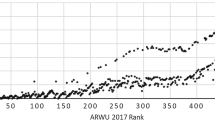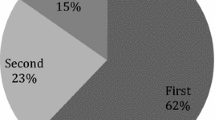Abstract
We investigate possible effects from a strong encouragement for a large number of publications on the scientific production of a Brazilian cell biology department. An average increase in individual absolute production and a concomitant decrease in individual participation in each paper were detected by traditional bibliometric parameters, such as number of publications, citations, impact factors and h index, combined to their “effective” versions, in which co-authorship is taken into consideration. The observed situation, which might well represent a national trend, should be considered as a strong warning against current criteria of scientific evaluation heavily based on uncritical counting of publications.
Similar content being viewed by others
References
J. E. Hirsh, An index to quantify an individual’s scientific research output, Proc. Natl. Acad. Sci. USA, 102 (2005): 16569–16572.
D. Adam, The counting house, Nature, 415 (2002): 726–729.
A. R. Weale, M. Bailey, P. A. Lear, The level of non-citation of articles within a journal as a measure of quality: a comparison to the impact factor, BMC Medical Research Methodology, 4 (2004): 14.
E. Garfield, The history and meaning of the journal impact factor, JAMA, 295 (2006): 90–93.
C. D. Kelly, M. D. Jennions, The h index and career assessment by numbers, Trends in Ecology and Evolution, 21 (2006): 167–170.
H. L. Roediger, III, The h index in science: A new measure of scholarly contribution, The Academic Observer, 19.
P. D. Batista, M. G. Campbell, O. Kinouchi, A. S. Martinez, Is it possible to compare researchers with different scientific interests? Scientometrics, 68 (2006): 169–179.
M. Hermes-lima, A. C. Alencastro, N. C. Santos, C. A. Navas, R. O. Beleboni, The relevance and recognition of latin american science. Introduction for the fourth issue of CBP-Latin America, Comp. Biochem. Phys. C, 146 (2007): 1–9.
W. Glänzel, J. Leta, B. Thijs, Science in Brazil. Part 1: A macro-level comparative study, Scientometrics, 67 (2006): 67–86.
J. Leta, W. Glänzel, B. Thijs, Science in Brazil. Part 2: Sectoral and institutional research profiles, Scientometrics, 67 (2006): 87–105.
A. S. Melo, L. Bini, P. Carvalho, Brazilian articles in international journals on limnology, Scientometrics, 67 (2006): 187–199.
M. Hermes-Lima, N. Santos, A. Alencastro, S. T. Ferreira, Wither Latin America? Trends and challenges of science in Latin America, IUBMB Life, 59 (2007): 199–210.
R. Meneghini, The key role of collaborative work in the growth of brazilian science in the last ten years, Scientometrics, 35 (1996): 367–373.
J. Leta, H. Chaimovich, Recognition of international collaboration: the Brazilian case, Scientometrics, 53 (2002): 325–335.
J. M. Russell, The increasing role of international-cooperation in science and technology research in Mexico, Scientometrics, 34 (1995): 46–61.
J. Cohen, Scientific collaboration — Latin America elite looks north for scientific partners, Science, 267 (1995): 809–810.
F. Narin, K. Stevens, E. S. Whitlow, Scientific co-operation in europe and the citation of multinationally authored papers, Scientometrics, 91 (1991): 313–323.
J. S. Katz, B. R. Martin, What is research collaboration? Research Policy, 26 (1997): 1–18.
W. Glänzel, A. Schubert, H. J. Czerwon, A bibliometric analysis of international scientific cooperation of the European Union (1985–1995), Scientometrics, 45 (1999): 185–202.
W. Glänzel, A. Schubert, Double effort = double impact? a critical view at international co-authorship in chemistry, Scientometrics, 50 (2001): 199–214.
D. R. S. Bailey (Ed.), Martial epigrams vol. 1 book III epigram 43, Harvard University Press, The Loeb Classical Library (1993).
Author information
Authors and Affiliations
Corresponding author
Rights and permissions
About this article
Cite this article
Pereira De Araújo, A.F. Increasing discrepancy between absolute and effective indexes of research output in a Brazilian academic department. Scientometrics 74, 425–437 (2008). https://doi.org/10.1007/s11192-007-1817-6
Received:
Published:
Issue Date:
DOI: https://doi.org/10.1007/s11192-007-1817-6




